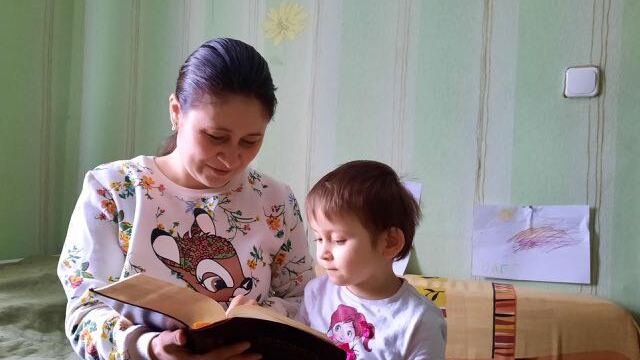How to Give Effective Help and Support to Brothers and Sister: Grasp 3 Principles
By Yinzi
The Bible says, “But the end of all things is at hand: be you therefore sober, and watch to prayer. And above all things have fervent charity among yourselves: for charity shall cover the multitude of sins. Use hospitality one to another without grudging. As every man has received the gift, even so minister the same one to another, as good stewards of the manifold grace of God” (1 Peter 4:7–10). As servants of the Lord, we should do the church’s work well, help and support brothers and sisters, and finally bring them before God so that they can all obey and worship God—this is what the Lord has entrusted to us. So, how exactly should we support and help brothers and sisters to be in harmony with the Lord’s will? There are three principles that all of us need to enter into.
First, treat brothers and sisters fairly when helping them.
It is written in the Bible, “My brothers, have not the faith of our Lord Jesus Christ, the Lord of glory, with respect of persons. For if there come to your assembly a man with a gold ring, in goodly apparel, and there come in also a poor man in vile raiment; And you have respect to him that wears the gay clothing, and say to him, Sit you here in a good place; and say to the poor, Stand you there, or sit here under my footstool: Are you not then partial in yourselves, and are become judges of evil thoughts?” (James 2:1–4). As can be seen from the example in these verses, if we look up to and fawn over those who are wealthy and renowned or those who have gifts, a good mind and a way with words while we disdain and even exclude those who are honest and have no money or power, then doing such things is loathed by God. As is known to us, God is righteous and He treats everyone fairly and reasonably based on principles. So, as Christians we must treat others fairly in accordance with God’s requirements.
Often times, however, we help others according to our own preferences. For example, we are willing to fellowship with and assist those who are to our liking and compatible with us and those who follow our wishes in everything and listen to us, but as for those who aren’t to our liking, and those who haven’t obeyed us and even have dealt with and criticized us, even if we see they have problems and difficulties, we are unwilling to give them a hand, and even though we communicate with them, we carry resistance and dissatisfaction. Such behaviors are not in line with the Lord’s teachings.
The Lord Jesus has said, “This is My commandment, that you love one another as I have loved you” (John 15:12). “Judge not according to the appearance, but judge righteous judgment” (John 7:24). The Lord instructs us to love each other and treat others fairly. No matter whether brothers and sisters are to our liking or not, of good caliber or bad, poor or rich, have position or not, and no matter how long they have believed in God, we cannot treat them based on our emotions or get close to this one and distance that one. As long as they truly believe in God, we should treat them as equals. Only by frequently practicing like this and helping brothers and sisters with a loving heart can we earn the Lord’s praise.
Second, harbor right intentions in helping brothers and sisters.
It is said in the Bible, “Servants, obey in all things your masters according to the flesh; not with eye-service, as men pleasers; but in singleness of heart, fearing God; And whatever you do, do it heartily, as to the Lord, and not to men” (Colossians 3:22–23). These words say clearly that we should put our intentions right in serving God and helping brothers and sisters. It shouldn’t be done in front of others to gain their praise, but should be done to complete God’s commission and satisfy Him.
Yet how do we practice? From the outside, we appear to actively help and support brothers and sisters when they are negative and weak, and busy ourselves with shepherding and supporting the churches through rain and storm. But actually, we often have incorrect intentions and think inside, “Seeing my behaviors, the brothers and sisters will surely look up to me, praise me for achieving good results in work and having truth, and say that I’m loyal to the Lord and a good servant of Him.” Clearly, our helping brothers and sisters is to obtain their high esteem and praise, to have place in their hearts and make them look up to and adore us, and to establish our own image with them, but not to exalt and testify the Lord and bring them before Him. There are even some people who support brothers and sisters for the sake of furthering their fleshly interests and getting material things. I have heard of such a thing. When a preacher went to a church and saw that the brothers and sisters there hadn’t given him preaching fees, then he was unwilling to give them sermons and simply went through the motions in fellowshiping, but when they offered money, he became very active in fellowshiping. This kind of service is purely for the sake of making a deal and obtaining rewards and interests; it is simply not fulfilling duties to satisfy God.
Thinking about this carefully, in order to save mankind, God came to earth from heaven. He bestowed on man endless grace and blessings, and was willing to sacrifice His life to redeem mankind, to be crucified. God never stops paying the price for us humans and He has never asked for anything in return. As believers in God, we should emulate Christ, and we should put our intentions right and sincerely help brothers and sisters. It shouldn’t be done for the sake of gaining others’ admiration or looking for something in return. Instead, we should willingly pay a price and help others to fulfill what God has entrusted to us. Only in this way will we conform to God’s will and attain His blessings.
Third, appropriate censure and dealing is allowed when helping brothers and sisters.
When we help brothers and sisters with a correct motive, fellowship with them out of love and patiently guide them, some of them can understand God’s will and come out of their negative state. But we all have met with these kinds of situations: Though we have helped and supported some brothers and sisters several times, there is no shift in their state and they still remain the same; some clearly know God’s words and understand how to practice in conformity with God’s will, but they still act willfully on their own initiative, go against God’s teachings and rely on satanic disposition in what they do. When faced with such situations, what can we do to be responsible for their lives? I read the following in the Bible, “Open rebuke is better than secret love. Faithful are the wounds of a friend; but the kisses of an enemy are deceitful” (Proverbs 27:5–6). We can understand from these verses that when we see the problems or shortcomings of brothers and sisters, we should dare to point them out face to face to help them, not hiding these things in our hearts. Even if what we say is unpleasant to listen to and makes them temporarily uncomfortable, it is true love and help for them. I have heard these words from a preacher, “Suppose there is a brother or sister who does not pursue the truth, and is not going the right way. What should you do? You must help this person. This help includes pruning them and dealing with them. It includes censure and criticism. This is the way to help. All of this is love. Is it necessary to coax them along or use a consulting tone? Not necessarily. If there is a need for pruning and dealing with them, do it. Expose what should be exposed. … This is the duty that you should fulfill” (“How One Must Experience God’s Work in Order to Achieve Salvation and Be Perfected” in Sermons and Fellowship on Entry Into Life (VI)). It can be seen from this that helping with love needn’t be speaking tactfully and gently; criticizing and dealing with brothers and sisters according to their problems and shortcomings to make them know their corruptions and shortcomings and understand the truth is also love for them.
We may encounter these situations: Some brothers and sisters are so arrogant and insubordinate to anyone that others feel restrained by them; some trifle over minor matters and can’t be tolerant and patient with others; some judge others behind their backs; some are affected by the influences of evil trends and devote themselves to making money and pursuing the world, thus failing to attend meetings regularly; and so on. When faced with such things, we can gently fellowship with and support these brothers and sisters, and if necessary, we can strictly deal with and prune them to help them know the serious consequences of carrying on this way and understand the Lord’s will so that they can repent and change before it is too late.
The above three principles are indispensable for helping and supporting brothers and sisters. Only by grasping and practicing these principles can we be after God’s heart, and can our helping and supporting brothers and sisters count as a good deed and win the Lord’s approval.
- 1Why Is It Hard for a Rich Man to Enter God’s Kingdom?
- 2What Is the Meaning of the Parable of the New Cloth and Old Garment?
- 3What Do the Overcomers in the Bible Refer To?
- 4What Does John 3:36 Mean?
- 5What Is the Church of Philadelphia in the Bible?
- 6Are You Really Worshiping the Lord Jesus at Christmas?











